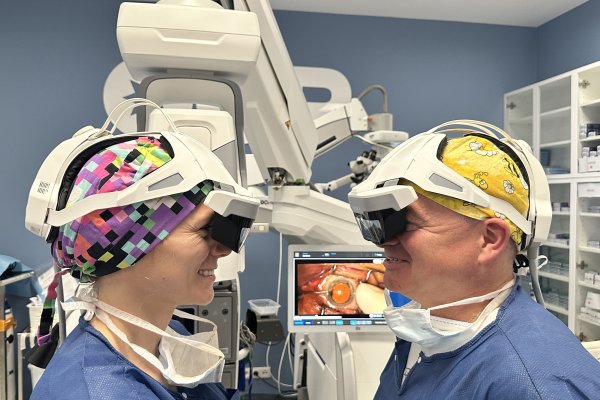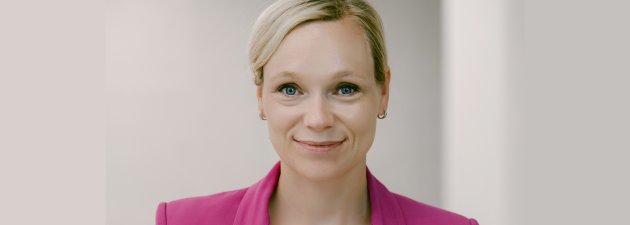At a young age, she has performed more than ten thousand intraocular surgeries, and this year she reached a remarkable professional goal, passing the most demanding international exam in her field and thus receiving the prestigious FEBOS-CR title – a European qualification in cataract and refractive surgery. She has achieved this as the first female ophthalmologist in the Czech Republic! We have talked to Andrea Janeková, Head Physician of Eye Centre Prague (OCP).
Success doesn’t come for granted
They say that behind every successful man there’s a great woman. Who is behind you?
Of course, there’s a great man and also many years of patient, hard work that wasn’t necessarily too visible at first. Actually, I have to mention two men – my husband Adam, who is in fact my superior at Eye Centre Prague, but with whom we get along great, and also my father-in-law – the excellent cataract surgeon Michal Janek, who has performed more than thirty thousand surgeries. Both have given me every support to keep going on my professional path, although it was often difficult to combine it with motherhood.
How does operating surgeon training look like? Does it take a long time before the doctor can stand behind the operating table alone?
It is definitely true that learning makes perfect. For me, it was perhaps all the more difficult because in a prestigious private clinic like OCP, there is enormous pressure on the operating surgeon – when it comes to speed, accuracy, quality and complete safety for the patient. I joined OCP right after school, and there was no room for trying things. When I had worked at OCP for a few years, my father-in-law suggested that I joined him at Klatovy hospital to practice surgeries. So at that time, I would pick up my little daughter from kindergarten on my way from work at OCP, and then we would drive for two hours to Klatovy, where I would hand her over to her grandmother. The next morning I would go to the hospital to operate, and then we would return to Prague. Later I took up internships at the University Hospital Královské Vinohrady in Prague, and only then I started operating under the guidance of experienced surgeons at OCP. It took two years before I could perform surgeries on my own.
Today, you can handle two and a half thousand different eye surgeries per year. To me, eye surgeries seem to be extremely demanding as they require absolute precision and coordination of the surgeon’s hands and feet as well as senses. Is that correct?
You are right. We operate with our hands and feet on an area of a few square millimeters, sometimes during surgery we move in units smaller than a millimeter and we have to coordinate the movements of all limbs in milliseconds. We sit when performing surgeries, because our legs are active as well – these days, one foot pedal of a special device can have around twenty functions. For example, when we separate the lenticule during the SMILE procedure, which helps patients with near-sightedness, we separate the special layers in the cornea that were previously created by the laser. Here we are guided by our sight but also by the resistance of the instrument in the tissue, because such a small dimension is not visible. Plus we also check the devices by ear. Not only do some of them communicate with us, but most importantly, we need to hear any suspicious sounds right away.

Eye Centre Prague (OCP) became the first private clinic in Europe to try a unique surgical technology inspired by the helmets of F-35 fighter pilots. This breakthrough method uses an XR 3D microscope and special 3D helmets. The photo shows Andrea Janeková, MD and Radan Zugar, MD
Czech doctors set trends
Do you have the opportunity to work with the most modern devices and technologies at Eye Centre Prague?
At OCP, we have top-notch equipment and well-educated doctors, both on a higher level than many foreign clinics. I hope it doesn’t sound arrogant if I say that in some aspects we set trends even in Western Europe. We see doctors from other countries come to our clinic, which proves my point. For example, we recently welcomed a group of Israeli eye surgeons to our clinic for the second time. They watched our surgeries but were also eager to see how we set up the entire patient care process.
Thanks to sharing experiences with foreign colleagues, we can save people's health together, regardless of country borders – and that’s a beautiful feeling.
Is it usual in your field to transfer know-how between foreign colleagues?
So far, I have seen there are very nice and friendly relations between us, because we all love our work. Every year, I take part in several professional conferences in various countries, where I often give lectures and present the results of our work, including selected clinical studies. Just as I share my experience, so do my foreign colleagues – we enrich and learn from each other. I think we all feel that this is for the benefit of our patients, whether they are in our home country or abroad. Figuratively speaking, our shared experience can save people's health regardless of country borders – and that’s a beautiful feeling.
Inspiring young ophthalmologists
Speaking of sharing experience, this is something you have been doing for a long time, having trained young ophthalmologists for several years.
That’s right. At OCP we saw a lack of young doctors in our field, and that’s why we have focused on their continuous education and founded our own academy for them, which prepares them in both practical and theoretical terms. We even received the highest level of accreditation from the Ministry of Health of the Czech Republic, and thus became an accredited workplace III. type for ophthalmology. This recognition allows us to conduct specialised training programs for ophthalmology and offer professional internships to medical facilities, including regional and university hospitals.
Besides your involvement in the OCP Academy, you also take part in teaching young eye surgeons abroad. How does that work?
I will always remember where I once started and what has helped me get here. Among other things, I took part in trainings at wet labs abroad, where I learned to operate on pig's eyes under the guidance of experienced surgeons. That’s why today I act as an instructor at these events and participate in teaching cataract surgery. At one of the largest such events, in Sofia, they operate on up to 4,000 pig eyes, and there are about fifty budding surgeons in training. But it’s not all about one-way teaching. Lecturers also learn from questions, which moves them forward. In the medical field, discussion should lead to further improvement and progress.
You also address young doctors within the Czech Society of Refractive and Cataract Surgery. You are member of its board of directors and also hold the position of scientific secretary there. You have announced a new grant competition.
Yes, my colleagues and I devised a grant competition for doctors aged under 35, and 2024 was its first year. Our aim is to motivate them to study and educate themselves further, and the best ones will receive a financial contribution from us.
You received the FEBOS-CR title, passing the most demanding international exam in your field, which has enormous prestige. What does that mean for you?
It’s a great honour for me, but I also see it as a commitment and motivation for further professional development, to provide our patients with ever better care – and also to keep sharing my experience with younger colleagues. The eye may seem like a tiny organ, but it is so vast that future challenges remain enormous. I’m excited to see Czech ophthalmologists help tackle these challenges with their solutions.
Andrea Janeková was interviewed by Jana Jenšíková
Photo credits: Eye Centre Prague



